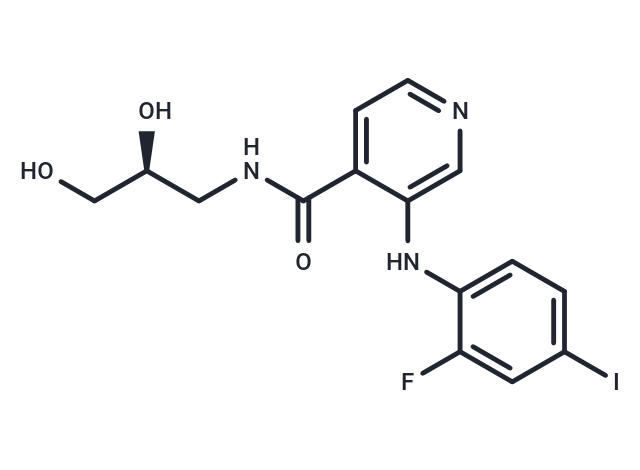Shopping Cart
- Remove All
 Your shopping cart is currently empty
Your shopping cart is currently empty

Pimasertib (AS703026) is an orally bioavailable small-molecule inhibitor of MEK1 and MEK2 (MEK1/2) with potential antineoplastic activity.

| Pack Size | Price | Availability | Quantity |
|---|---|---|---|
| 2 mg | $31 | In Stock | |
| 5 mg | $45 | In Stock | |
| 10 mg | $56 | In Stock | |
| 25 mg | $93 | In Stock | |
| 50 mg | $150 | In Stock | |
| 100 mg | $231 | In Stock | |
| 200 mg | $300 | In Stock | |
| 1 mL x 10 mM (in DMSO) | $50 | In Stock |
| Description | Pimasertib (AS703026) is an orally bioavailable small-molecule inhibitor of MEK1 and MEK2 (MEK1/2) with potential antineoplastic activity. |
| Targets&IC50 | MEK1/2 (MM cell lines):5 nM-2 μM |
| In vitro | At dosages of 10 mg/kg, AS703026 effectively inhibits the growth of colorectal xenograft tumors with K-Ras mutations (D-MUT) in humans and significantly reduces p-ERK levels. Additionally, at concentrations of 15 and 30 mg/kg, AS703026 substantially inhibits the growth of human myeloma H929 mM xenograft tumors. This inhibition is likely associated with the downregulation of pERK1/2, induced PARP cleavage, and reduction in microvasculature. |
| In vivo | AS703026 (10 μM) effectively inhibits the ERK pathway, proliferation, and transformation in human DLD-1 colorectal cancer cells carrying K-Ras mutant alleles (D-MUT). It suppresses the growth and viability of human multiple myeloma cells, including U266 and INA-6 cells, with IC50 values of 5 and 11 nM, respectively. This inhibitory action of AS703026 is mediated by G0-G1 cell cycle arrest and is accompanied by a reduction in MAF oncogene expression. In the presence or absence of bone marrow stromal cells (BMSC), AS703026 further induces apoptosis in MM cells via caspase-3 and PARP cleavage. AS703026 is effective in the treatment of colorectal cancer caused by K-Ras mutations. |
| Kinase Assay | The Aurora kinase activity is measured with 10 μM ATP and a peptide containing a dual repeat of the kemptide phosphorylation motif. |
| Cell Research | Method: Measuring incorporation of 14C-labelled thymidine into newly synthesized DNA within the cells to determine the ability of JNJ-7706621 to inhibit the proliferation of cell growth. Cells are trypsinized and counted and 3-8 ×103 cells are added to each well of a 96-well CytoStar tissue culture treated scintillating microplate in 100 μL complete medium in a volume. Cells are incubated for 24 hours at 37 °C in an atmosphere containing 5% CO2. Next, 1 μL JNJ-7706621 is added to the wells of the plate. Cells are incubated for another 24 hours. Methyl 14C-thymidine 56 mCi/mmol is diluted in complete medium and 0.2 μCi/well is added to each well of the CytoStar plate in a volume of 20 μL. The plate is incubated for 24 hours at 37 °C in JNJ-7706621 with 14C-thymidine. The contents of the plate are discarded and the plate is washed twice with 200 μL PBS. 200 μL of PBS is added to each well. The top of the plate is sealed with a transparent plate sealer and a white plate backing sealer is applied to the bottom of the plate. The degree of methyl 14C-thymidine incorporation is quantified on a Packard Top Count. |
| Alias | SAR 245509, MSC1936369B, AS703026 |
| Molecular Weight | 431.2 |
| Formula | C15H15FIN3O3 |
| Cas No. | 1236699-92-5 |
| Smiles | OC[C@@H](O)CNC(=O)c1ccncc1Nc1ccc(I)cc1F |
| Relative Density. | 1.769 g/cm3 |
| Storage | Powder: -20°C for 3 years | In solvent: -80°C for 1 year | Shipping with blue ice. | |||||||||||||||||||||||||||||||||||
| Solubility Information | Ethanol: < 1 mg/mL (insoluble or slightly soluble) DMSO: 45 mg/mL (104.36 mM), Sonication is recommended. | |||||||||||||||||||||||||||||||||||
Solution Preparation Table | ||||||||||||||||||||||||||||||||||||
DMSO
| ||||||||||||||||||||||||||||||||||||

Copyright © 2015-2025 TargetMol Chemicals Inc. All Rights Reserved.